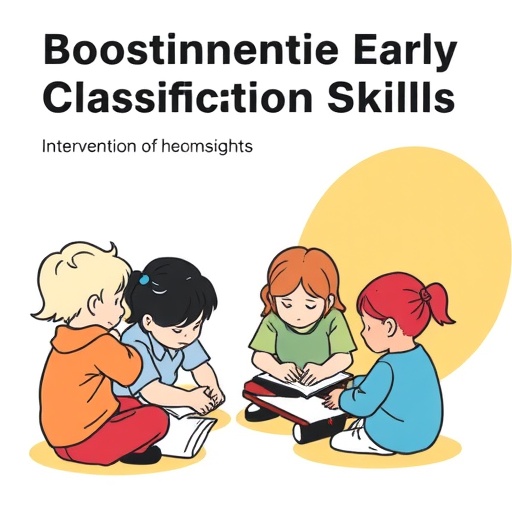In a groundbreaking study set to be a hallmark within the field of early childhood education, researchers have explored the intricacies of early classification skills in young learners. Led by García-Landete and supported by a team of dedicated scholars, the paper titled “Effectiveness of an Intervention in Early Classification Skills: A Study on Formation and Transfer of Sets,” published in the International Journal of Educational Psychology (IJEC), reveals compelling findings that may alter pedagogical approaches across educational settings. This study emphasizes the pivotal role classification skills play in cognitive development, particularly in formative years.
The researchers meticulously designed an intervention program aimed at enhancing the classification abilities of preschool children. The study demonstrates how such early interventions can have profound implications not just on immediate learning outcomes, but also on long-term cognitive skills that children carry into later education. Classification, which involves organizing items into categories based on shared characteristics, serves as a fundamental building block for higher-level thinking skills. The implications for educational practices are multi-faceted, opening avenues for more tailored educational interventions in early childhood settings.
The design of the intervention was nothing short of innovative. It engaged children in playful, yet purposeful activities that encouraged interaction with various set elements. This hands-on approach allowed children to physically manipulate objects, thereby facilitating a deeper understanding of classification principles. The methodology underscored the necessity of active participation in the learning process, highlighting a shift from traditional rote learning to engaging, experiential activities that resonate more with young learners.
One of the most significant findings of the research is the observation that children exposed to the intervention demonstrated markedly improved classification skills compared to their peers in conventional educational environments. The results were quantified through a series of assessments that measured both the accuracy and speed of classification tasks. This data underscores the effectiveness of the intervention, emphasizing that structured, yet flexible educational approaches can yield measurable advancements in cognitive skills.
Moreover, the study delved into the notion of transfer of learning, a critical aspect of educational psychology which discusses how knowledge acquired in one context can be applied in others. Children in the experimental group not only excelled at tasks directly related to the intervention but also showcased improved abilities in tasks that required similar cognitive skills, thus indicating a successful transfer of learning. This finding advocates for the strategic design of educational programs that encourage broader cognitive applications.
The researchers also took into consideration the role of socio-cultural factors in shaping children’s learning experiences. They examined how background and environment influence children’s ability to classify and conceptualize their world. By integrating such socio-cultural dimensions into their analysis, García-Landete and colleagues provide a comprehensive perspective on educational strategies, urging educators to consider the unique backgrounds of their students when implementing interventions.
Challenging existing paradigms in early childhood education, this study propels a debate on the importance of early classification skills. It argues that foundational cognitive skills laid during preschool years set the stage for complex problem-solving abilities in later stages of education. Such findings connect to broader educational frameworks, suggesting that governments and educational institutions may need to reassess how curricula are constructed and delivered to young children.
Furthermore, a key implication of this research suggests the integration of cross-disciplinary approaches in the classroom. By blending elements of art, science, and play-based learning into classification tasks, educators can foster an enriched environment that bolsters engagement and cognitive growth. This could lead to a reimagining of daily classroom activities, shifting the focus towards more interdisciplinary methods that captivate students’ interests while embedding critical thinking skills.
As the educational community digests these findings, they may also reflect on the potential barriers to implementing such innovative intervention strategies. Teacher training, resources, and institutional support play critical roles in the successful deployment of educational programs aimed at enhancing classification skills. Addressing these systemic challenges will be essential for translating research findings into actionable classroom activities that can benefit a larger population of young learners.
Importantly, the research sets an example of how continuing investigations into fundamental educational practices can yield substantive insights. The commitment to understanding each aspect of classification and how it relates to overall cognitive growth positions this study as a vital contribution to the educational literature. It encourages ongoing dialogue among educators, researchers, and policy makers regarding the significance of early educational interventions.
In sum, this riveting research elevates the conversation around early childhood education, establishing classification skills as crucial for cognitive development. As the educational landscape continues to evolve, approaches informed by such thoughtful research will be paramount in cultivating future generations equipped with robust classification and critical thinking skills. The advocacy for early intervention makes a compelling case for strategic changes in educational practices that can benefit a diverse population of learners.
In conclusion, the collaborative efforts present in this study highlight the potential for research-driven strategies to redefine early education. As García-Landete and colleagues pave the way for a new understanding of cognitive skill development, educators and institutions are implored to embrace innovation and adapt to the evolving needs of their students. This approach not only nurtures intellectual curiosity but also empowers a generation of young thinkers who are better prepared to navigate an increasingly complex world.
By embracing the findings of this research, educational practitioners have the opportunity to create learning environments that are not only effective but inclusive, ensuring that every child has access to the benefits of quality education centered on the fundamental skills that underpin lifelong learning.
Subject of Research: Early childhood education, classification skills, cognitive development.
Article Title: Effectiveness of an Intervention in Early Classification Skills: A Study on Formation and Transfer of Sets.
Article References:
García-Landete, J.M., García-Piqueras, M., Paños, E. et al. Effectiveness of an Intervention in Early Classification Skills: A Study on Formation and Transfer of Sets. IJEC (2025). https://doi.org/10.1007/s13158-025-00440-6
Image Credits: AI Generated
DOI:
Keywords: Early classification skills, cognitive development, educational intervention, preschool education, learning transfer, interdisciplinary approach.




